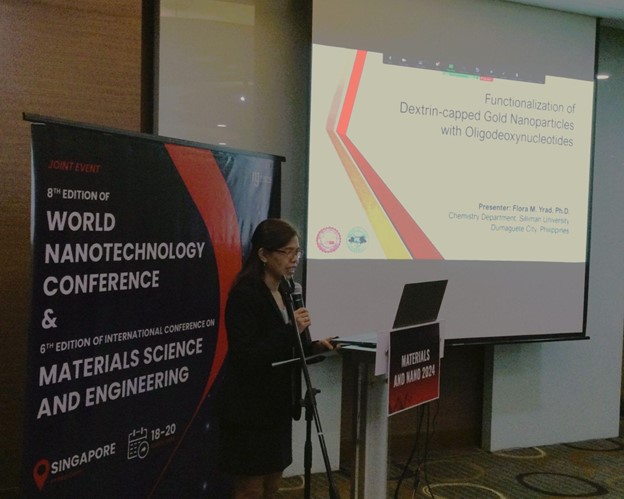
SU Chemistry Department Chair presents paper in Singapore

Dr. Flora M. Yrad presents her paper at the 8th Edition of World Nanotechnology Conference and 6th Edition of International Conference on Materials Science and Engineering in Singapore on March 18, 2024.
Silliman University (SU) College of Arts and Sciences – Chemistry Department Chair Dr. Flora M. Yrad presented her paper titled, “Functionalization of Dextrin-capped Gold Nanoparticles with Oligodeoxynucleotides” during the 8th Edition of World Nanotechnology Conference and 6th Edition of International Conference on Materials Science and Engineering, held at the Village Hotel Changi, Singapore on March 18-20, 2024.
Yrad’s study focused on the gold nanoparticle (AuNP), a colloidal zerovalent nanoscale gold core generally capped by an organic layer and dispersed in a solvent. Gold nanoparticles have very unique properties and become very popular in many applications, especially in biosensors. Biosensors are devices that use biomolecules to detect the presence of atoms, ions, molecules, or microorganisms. Before the gold nanoparticles can be used in biosensors, a functionalization process is performed which involves the attachment of biomolecules like proteins, carbohydrates, or nucleic acids like DNA.
“At their nanometer size, many materials exhibit unique properties very different from their bulk
size. Example, gold in bulk size like in jewelry is yellow and solid while the same gold in 10 nanometer size is not solid but exists as a colloidal matter suspended in liquid solution and colored red,” Yrad explained in a separate email correspondence.
Nanotechnology involves the synthesis, manipulations, and applications of materials in their nanometer size. One nanometer is one billionth of a meter. Written out, 1 nanometer is
0.000000001 m, which is very tiny. In her research abstract describing gold nanoparticles, Yrad cites, “Their unique properties offer great potential applications in many fields including biosensing. DNA-functionalized AuNPs are popular in biosensors due to their ability to recognize and interact with target molecules through DNA recognition sequences.”
Her study aimed to “functionalize dextrin capped AuNP with DNA oligonucleotide to produce a functional gold nanoparticle/reporter DNA (AuNP/rDNA) conjugate intended as reporter probe for a lateral flow biosensor for dengue RNA detection.”
“My presentation is about the research I did on DNA-functionalization of dextrin-capped gold nanoparticles (AuNPs). DNA-functionalization means the replacement of dextrin capping around the surfaces of colloidal gold with short single stranded DNA. In simple terms, the attachment of DNA strands to the surfaces of gold nanoparticles,” she said.
“The number of DNA strands on the surface of each gold nanoparticle is called DNA loading. Determination of DNA loading is valuable because it was reported in literature that higher DNA loading has the potential to impact bio-detection. Knowing the number of DNA strands attached to the dextrin-capped gold nanoparticles will be of interest for research works, especially in biosensors,” she added.
The conference aimed to host a scientific meeting of speakers and delegates from several countries involved in biomedicine, chemistry, physics, engineering, and other fields that employ nanomaterials in research. Researchers and educators in the different fields who presented together with Yrad during the first day of the conference came from the UK, Italy, Russia, Malaysia, Japan, South Africa, and India.
This is the second World Nanotechnology Conference Yrad participated in, the first being in April 2022 during its 4th Edition, held virtually via Zoom. There, she presented her research titled, “Modified Synthesis of Dextrin-capped Gold Nanoparticles and its Chemistry.”
Yrad conducted her dissertation research at the Nano-Biosensors Lab, Department of Biosystems and Agricultural Engineering, Michigan State University, USA, under the guidance of her US professor and founding member of the Nano-Biosensors Lab Dr. Evangelyn C. Alocilja, with funding from the United States Agency for International Development (USAID) Advanced Research Scholarship and the Silliman Faculty Development Committee (FADECO) Doctoral Scholarship. She had been publishing her works on modified synthesis of dextrin-capped gold nanoparticles and dengue RNA detection using lateral flow biosensor.
In 2019, Yrad graduated at the University of San Carlos, Cebu City with a PhD in Chemistry and obtained the position of an Associate Professor at SU in February 2023.


